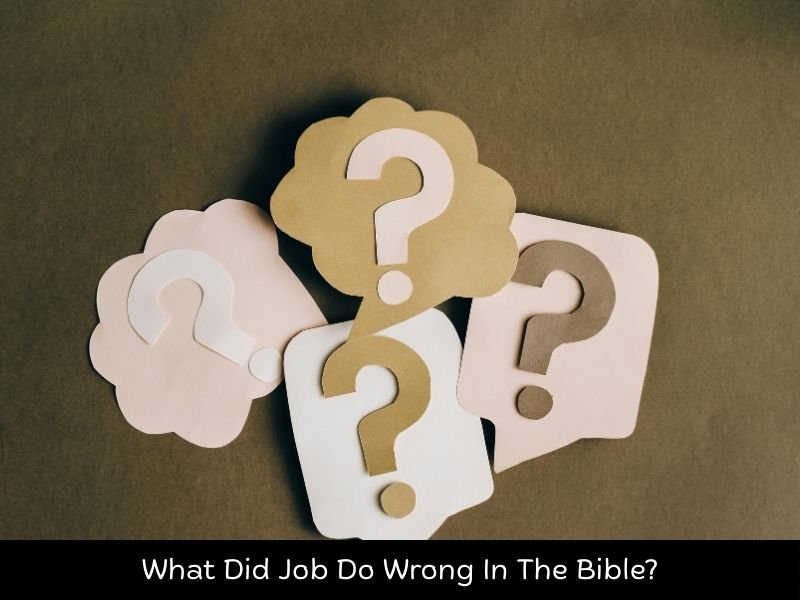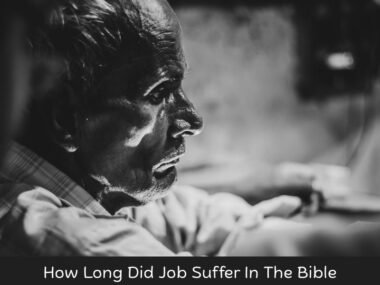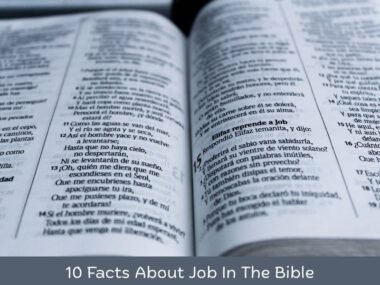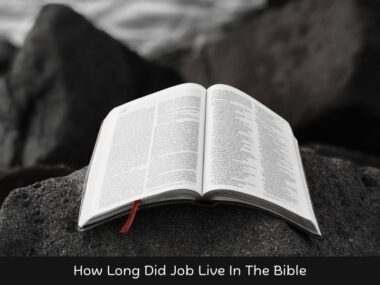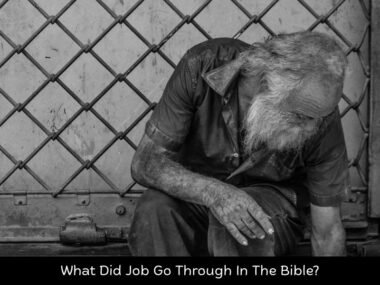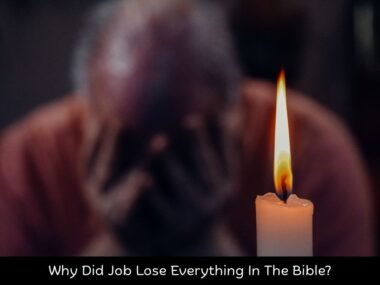Few biblical figures stir as much reflection and debate as Job. His story is not just about loss or endurance—it’s about wrestling with the hardest questions of life: Why do the righteous suffer? Where is God in our pain? Though Job is widely praised for his faithfulness under extreme trial, a closer reading reveals a man who did more than silently endure. He questioned, lamented, and even challenged God’s justice. This analysis explores Job not only as a symbol of perseverance but also as a deeply human figure whose responses invite us to examine whether—and how—he may have erred.
Job’s Righteousness: Faultless Yet Fallible
From the beginning, Job is introduced as a man of outstanding moral character: “There was a man in the land of Uz, whose name was Job; and that man was blameless and upright, and one who feared God and shunned evil” (Job 1:1, NKJV). This sets the framework for understanding Job’s trials—not as punishment, but as a test of his devotion.
Still, being described as “blameless” does not imply Job was without flaw. The term speaks to his integrity and sincere commitment to God, not to sinless perfection. As his story unfolds, so too does his deeply human response to suffering, marked by grief, frustration, and at times, defiance. His raw conversations with his friends and his direct appeals to God expose a complexity that challenges a simplistic view of Job as purely passive or perfectly patient.
Job’s Responses to Suffering
Expressions of Despair and Self-Pity
After losing his wealth, children, and health, Job’s initial response is one of mourning and worship: “Then Job arose, tore his robe, and shaved his head; and he fell to the ground and worshipped” (Job 1:20, NKJV). However, as his suffering persists, Job’s lamentations intensify. In Job 3, he curses the day of his birth, expressing a desire never to have existed:
“May the day perish on which I was born, and the night in which it was said, ‘A male child is conceived'” (Job 3:3, NKJV).
These expressions reveal a deep despair and a longing for escape from his afflictions. While such emotions are natural in the face of immense suffering, they also indicate a shift from initial acceptance to profound anguish and self-pity.
Accusations Against God
As dialogues with his friends progress, Job begins to question God’s justice and even accuses Him of wrongdoing. In Job 19:6, he declares:
“Know then that God has wronged me, and has surrounded me with His net” (NKJV).
Such statements suggest that Job perceives himself as a victim of divine injustice. He challenges the retributive justice framework, where suffering is seen as a consequence of sin, by asserting his innocence and questioning God’s fairness.
Assertions of Self-Righteousness
In defending his integrity against his friends’ accusations, Job sometimes veers into self-righteousness. He meticulously recounts his virtuous deeds and moral conduct, implying that his righteousness should exempt him from suffering. For instance, in Job 31, he lists his ethical behaviours, from honesty to hospitality, to underscore his innocence.
While self-defence is understandable, Job’s emphasis on his righteousness borders on self-justification. He seems to equate his moral conduct with a claim to divine favour, which reflects a limited understanding of the complexities of divine justice and human suffering.
Theological Misunderstandings
In the heart of the Book of Job lies a profound theological debate—not only between Job and his friends but also within Job himself. One of the significant areas where Job may have gone wrong lies in his limited understanding of divine justice. This misunderstanding doesn’t make him wicked, but it does reflect a human error: trying to fit God into a predictable system.
Throughout the dialogues, Job and his friends wrestle with a rigid belief in retributive justice—the idea that good people are always rewarded and evil people always suffer. Job’s friends—Eliphaz, Bildad, and Zophar—insist that his suffering must be a punishment for sin. Job, on the other hand, knows he hasn’t committed any great wrongdoing and thus concludes that something is wrong with the system itself, or worse, with God’s justice.
In Job 21:7-9, Job openly questions this idea:
“Why do the wicked live on, growing old and increasing in power? They see their children established around them, their offspring before their eyes.”
Here, Job confronts the reality that wicked people often prosper, while the righteous suffer. He correctly critiques the simplistic view of retributive justice, but in doing so, he also crosses a line into accusing God of being unjust. This highlights a central tension: while Job’s critique of the retributive system is theologically significant, his insistence that God must therefore be unfair reveals a lapse in understanding.
Job did not fully grasp that God’s justice operates on a higher plane than human reasoning. His error was not in questioning or seeking understanding, but in assuming that divine justice must conform to human logic. In this way, what Job did wrong in the Bible was not sin in the traditional sense, but rather a failure to see the bigger picture of God’s sovereign and mysterious will.
God’s Response and Job’s Repentance
After lengthy debates and emotional laments, God finally answers Job, not with explanations, but with a series of rhetorical questions that emphasise divine wisdom and the vast difference between the Creator and His creation.
In Job 38:2-4, God begins:
“Who is this that darkens counsel by words without knowledge? Now prepare yourself like a man; I will question you, and you shall answer me.”
Rather than directly accusing Job of sin, God challenges Job’s limited perspective. Through chapters 38–41, God describes the wonders of creation, from the constellations to the behaviour of animals, all of which operate according to divine wisdom. The implicit message is clear: if Job cannot even grasp the workings of nature, how can he expect to understand the complexities of divine justice?
This response humbles Job. In Job 42:2-6, he replies:
“I know that You can do everything, and that no purpose of Yours can be withheld from You… Therefore I abhor myself, and repent in dust and ashes.”
This moment of repentance is profound. Job doesn’t repent of specific sins like theft or dishonesty, but of speaking without knowledge and questioning God’s governance of the universe. He acknowledges that he has overstepped, that he has “uttered what he did not understand.”
Here we see the culmination of what Job did wrong in the Bible: he allowed his suffering to cloud his understanding of God’s character. In his desperation, he wrongly assumed that either he was being punished unjustly or that God was not just. His repentance is a recognition that even the most righteous human being can err in perspective, especially when facing immense pain.
Was Job’s Repentance for Sin or Misunderstanding?
This question is crucial. Many readers interpret Job’s repentance as a blanket admission of wrongdoing, but it is more nuanced. God Himself, at the beginning of the story, declared Job “blameless and upright.” So, what does Job repent of?
The answer lies in the phrase “I spoke of things I did not understand” (Job 42:3). Job’s fault wasn’t moral corruption—it was theological arrogance, the belief that he could fully comprehend and critique God’s actions. What Job did wrong in the Bible was not rebellion but presumption.
This has profound implications for readers today. Job’s story reminds us that faith involves trust even when understanding fails. It’s not wrong to question or to feel grief, but we cross into dangerous territory when we presume to know better than God. Job’s repentance models a return to humility—a recognition that God’s ways are higher than ours.
God’s Vindication of Job
Interestingly, after Job repents, God turns to his friends and says something surprising in Job 42:7:
“My wrath is aroused against you and your two friends, for you have not spoken of Me what is right, as My servant Job has.”
This statement complicates the idea of what Job did wrong. Despite Job’s errors in judgment and speech, God still considers him to have spoken “what is right.” Why?
The likely explanation is that, unlike his friends, Job was honest in his struggle. He wrestled with God directly, voiced his doubts, and ultimately repented. His friends, on the other hand, falsely portrayed God as a simplistic dispenser of rewards and punishments. They claimed to defend God, but in doing so, they misrepresented Him.
Thus, Job is vindicated—not because he was perfect, but because he was humble, honest, and open to correction. He never turned away from God completely, even in his confusion and grief. His journey reveals that faith can include lament, doubt, and even mistakes, as long as it ends in trust.
Lessons from Job’s Experience
The Book of Job offers timeless lessons for anyone grappling with suffering and spiritual questions. Chief among these is the importance of humility. Job was not punished for wrongdoing, but he did err in how he spoke of God’s justice. His repentance teaches us that even the righteous must guard against pride and presumption.
Another key lesson is that God’s justice is not always immediately visible. What Job did wrong in the Bible was to assume that suffering implies guilt and that he could demand an explanation from God. This is a caution against the modern tendency to demand clarity and fairness on our terms. True faith involves trusting in God’s character even when His ways are mysterious.
Finally, Job’s story affirms that God is compassionate. He restores Job’s fortunes not because Job earned it, but because God is merciful. Even after Job’s harsh words, God does not hold them against him—He instead honors Job’s integrity and honesty.
The Complexity of Human Suffering
The story of Job underscores a critical theological truth: suffering is not always the result of personal sin. This is one of the most crucial corrections the book makes to the ancient understanding of divine justice. Many people, both in ancient times and today, instinctively connect pain with punishment. Job’s friends epitomise this belief, accusing him relentlessly of wrongdoing because they cannot reconcile his suffering with the idea of divine fairness.
But as the story makes clear, Job’s trials are not the result of sin—they are a divine test, allowed by God for reasons beyond human comprehension. This truth dismantles the rigid cause-and-effect model of suffering that Job and his companions assumed. Understanding what Job did wrong in the Bible requires us to also understand what he did right: he rejected false accusations, held onto his integrity, and continued to seek God despite his pain.
What Job did wrong was not his suffering or even his questioning—it was assuming that suffering meant God was unjust. His mistake was interpreting divine silence and suffering as divine betrayal. In this way, Job’s story becomes a blueprint for navigating pain while holding on to faith.
The Importance of Humility Before God
One of the central theological themes in the Book of Job is humility. Job’s journey takes him from a place of bold confrontation with God to a posture of reverence and surrender. Initially, Job asserts his right to question God’s justice, even demanding a divine audience to prove his innocence. But when God finally speaks, Job realises the magnitude of his presumption.
God’s response does not explain Job’s suffering. Instead, it emphasises the vast gulf between divine and human understanding. The implied question in God’s speeches is: if you cannot grasp how the physical world functions, how can you presume to understand My moral governance of it?
Job’s reply is not defensive. He responds with humility:
“I have heard of You by the hearing of the ear, but now my eye sees You. Therefore I abhor myself, and repent in dust and ashes.” (Job 42:5-6)
This response marks a pivotal transformation. Job moves from a faith based on hearsay to a deeply personal encounter with God. He recognises that his earlier declarations were based on incomplete knowledge and a narrow understanding of divine justice.
Thus, one of the key things Job did wrong in the Bible was to speak about God’s ways as though he could fully comprehend them. His repentance is not about sinful deeds but about an attitude of heart—an overestimation of his understanding and a lack of reverence for God’s mysterious wisdom.
The Dangers of Misrepresenting God
Job’s friends serve as a warning against theological overconfidence. They speak with the certainty of people who think they understand how God works. They believe in a transactional faith: if you’re good, you will prosper; if you’re suffering, you’ve sinned. This mindset, while simple, is spiritually dangerous because it misrepresents the nature of God.
God rebukes them harshly in the final chapter:
“My anger burns against you… because you have not spoken of me what is right, as my servant Job has.” (Job 42:7)
Despite all of Job’s complaints, doubts, and harsh words, he is ultimately commended for speaking rightly about God. Why? Because Job was honest in his struggle. He didn’t reduce God to a formula or distort His nature to make sense of suffering. He wrestled sincerely and stayed in a relationship with God, even when he was angry or confused.
What Job did wrong in the Bible—questioning God’s justice—was less offensive than what his friends did wrong: defending God falsely and arrogantly. This distinction is crucial. God prefers honest wrestling over false certainty. The lesson here is that it’s better to question God sincerely than to represent Him falsely with rigid, incomplete theology.
Restored, But Not Without Scars
At the end of the book, Job’s fortunes are restored. He receives more children, greater wealth, and longer life than before. But the restoration does not erase the pain he endured. He still carries the memory of loss, the weight of his experience, and the lessons he learned.
God’s restoration is not a reward for passing a test—it is an expression of divine grace. Job’s story does not promise that all suffering will end in material blessings, but it does affirm that God is not indifferent to our pain. He sees, He remembers, and He redeems in His own time and way.
Even in his restoration, Job remains humble. There is no indication that he feels vindicated or victorious. He remains a man transformed by suffering and by the encounter with God. His story reminds us that restoration in God’s eyes is not always about recovering what we lost but becoming who we were meant to be.
Final Reflections on What Job Did Wrong in the Bible
When asking the question “What did Job do wrong in the Bible?”, it’s important to approach the issue with theological nuance and empathy. Job’s mistakes were not moral failures—they were errors in perspective. He allowed his suffering to lead him into theological overconfidence, assuming he understood God’s purposes and motives.
Here are the key ways Job erred:
- He equated suffering with divine injustice – Job assumed that because he was suffering unjustly, God must be unjust.
- He spoke of things he did not understand – Job tried to explain the unexplainable and demanded answers from God as if they were his right.
- He became self-righteous in defending himself. In proving his innocence, Job risked portraying himself as more righteous than God.
Yet these wrongs are tempered by Job’s integrity, his honesty, and his willingness to repent. What Job did wrong in the Bible was ultimately the kind of wrong we are all prone to—human error born from pain and confusion, not rebellion or wickedness.
Job’s story is a gift to all who suffer. It teaches us that doubt is not sin, that questions can coexist with faith, and that God honours authenticity over pretence. It shows that even when we speak wrongly, if our hearts remain turned toward God, He is gracious to correct and restore us.
Conclusion
The Book of Job is one of the most complex and beautiful texts in all of Scripture. At its core is a question that resonates with every believer: Why do the righteous suffer? And implicit in that question is another—what, if anything, have we done wrong to deserve suffering?
Job’s story offers both warning and comfort. He did get some things wrong—he spoke hastily, he accused God, and he assumed he could understand divine justice. But he also did many things right—he held onto his faith, he pursued God relentlessly, and he repented when confronted with truth.
Understanding what Job did wrong in the Bible helps us examine our reactions to suffering. Do we try to justify ourselves? Do we blame God? Do we cling to simplistic theology instead of engaging with mystery?
Ultimately, Job’s story is not about divine punishment or human failure—it’s about a relationship. It’s about a God who is big enough to handle our questions, patient enough to correct our misunderstandings, and loving enough to restore us when we repent.
So, what did Job do wrong in the Bible? He misunderstood, he questioned, he presumed. But in the end, he trusted—and that made all the difference.

